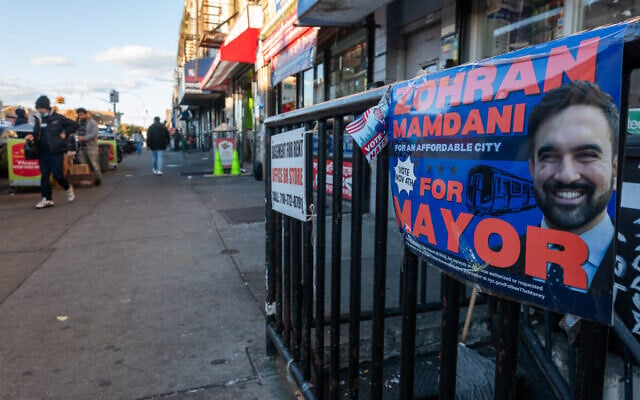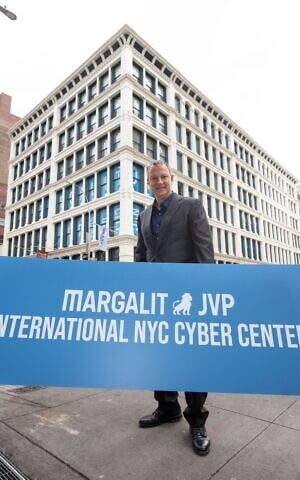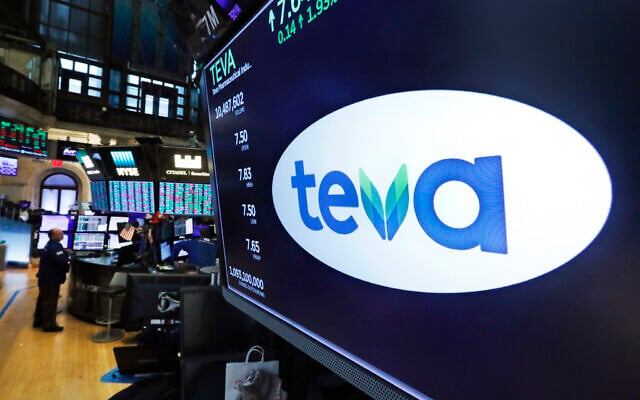On October 29, Israeli tech entrepreneurs gathered on a lower Manhattan podium to ring the opening bell of the New York Stock Exchange’s trading floor, in a show meant to celebrate the innovations and contributions of Israeli-founded startups.
Less than a week later, the man New Yorkers elected to be their next mayor took to a stage just a few miles away to announce that there was a new sheriff in town, one who is openly hostile to both Israel and Wall Street.
Sweeping to victory after a viral campaign that emphasized affordability and working-class rights, Zohran Mamdani heralded the dawning of a new day for the city.
But there is concern that the rise of the democratic socialist with a history of outspoken anti-Israel rhetoric, including support for a boycott of the Jewish state, will chill what has been a thriving business environment for Israeli entrepreneurs and companies.
“The mood is not great – we are unhappy with a new mayor that we understand does not like Israel, and has an inclination, which is anti-Israel,” said Erel Margalit, founder and executive chairman of venture capital fund Jerusalem Venture Partners. “We are worried about the rhetoric and maybe some of the actions that a new mayor can take.”
Sign up for the Tech Israel Daily and never miss Israel’s top tech stories
By signing up, you agree to the terms
A relative unknown before running for mayor, the 34-year-old has called the Palestinian cause “central to my identity,” both in and out of politics. He has condemned Israel for going to war against the Hamas terror group in Gaza, called for dismantling Israeli “apartheid,” and is a supporter of the BDS movement, which lobbies for an economic, cultural, and academic boycott of Israel.

On January 1, Mamdani will take over from Mayor Eric Adams, a staunch supporter of Israel who positioned himself as an advocate for the city’s Jewish communities and established a New York-Israel business council.
“New York’s tech ecosystem has always relied on global innovation, and the Israeli tech community plays a major role in that success,” said Guy Franklin, founder of Israeli Mapped in NY, which has tracked Israeli businesses in the city since 2013. He was one of 13 Israelis invited to ring the NYSE opening bell last month, along with the founders Salt Security, Remepy and others eager to showcase the impact of Israeli innovation in the city.
“Israeli startups will continue to thrive [in the US], selling to the world’s largest corporations,” Franklin told The Times of Israel. “The real question is whether Mamdani chooses to keep that energy in New York, or risk pushing it somewhere else.”
Investors, business leaders, and entrepreneurs reckoned that the implications of Mamdani’s mayoral victory for Israeli startups and companies will not necessarily be felt in legislation or explicit regulations, but in the business environment and atmosphere.

“The way some of the campaign policies or the campaign priorities Mamdani expressed definitely raises eyebrows for how Israelis will feel about doing business in New York,” said Aaron Kaplowitz, president of the United States-Israel Business Alliance, which works to foster business ties between the US and Israel. “I think Israelis, like any people, want to feel embraced and welcomed.”
“If they don’t feel that New York is going to be enthusiastic for their contributions, then they may also seek other cities,” Kaplowitz added.
Margalit, a former Knesset member for the Labor party, said a major concern was that Mamdani could work to reexamine or end contracts with Israeli companies in municipal units and affiliated public organizations and bodies.

Founded in 1993, JVP operates a cybersecurity innovation hub in downtown Manhattan, which has agreements and contracts with the New York City Economic Development Corp. A second hub for climate tech was launched together with the city in 2022. Together the two centers host 35 Israeli-founded startups, fostering collaborations with local banks, insurers and government agencies.
“We worry about some policies that could be stopped,” said Margalit. “We have public-private partnerships together with universities and cohorts of startups, and also run events together with the city — this is like a calling card of the city.”
But he expressed doubt that Mamdani would be willing to cancel existing contracts, which could prove expensive for the city.
“We don’t want anybody to touch our contracts with the city or the relationships that we have, which are making very good returns, so I don’t think they will stop,” he said.

There is however concern that moving forward Israeli firms selling the city everything from security cameras to smart city management software and cybersecurity services may find it harder to compete for future contracts.
“There are a lot of Israeli technologies that take their origins from military or defense use that keep the city safer, cleaner, greener, and less expensive,” Kaplowitz noted.
Concerns about Mamdani’s effect on New York’s business environment extend beyond Israelis.
To pay for his campaign promises of free buses and childcare, the mayor-elect is pushing state lawmakers to raise New York’s top corporate tax rate to up to 11.5 percent from the current maximum of 7.25%, a move which could encourage businesses to leave for any of the 48 states with lower tax burdens.
Convincing Albany to hike corporate taxes is thought to be a tall order, though he’ll likely find more support for raising taxes on business than an alternate plan he has floated to up income taxes on residents making at least $1 million annually.
“Even with the election of Mamdani, it’s important to remember that the mayor cannot, for example, simply raise corporate taxes overnight; there are legal, state-level, and economic checks in place,” said Franklin.

According to data by Israeli Mapped in NY, the city is currently home to 450 Israeli-founded startups, including 65 unicorns. There are around 80 cybersecurity companies, 50 financial tech firms, and other businesses operating in fields such as digital health and real estate tech.
The city, home to the largest concentration of Jews in the world, has become a major hub for Israeli businesses seeking to expand beyond Israel’s small domestic market, placing them at the heart of international commerce and providing a larger pool of potential investors and customers, including the American public and US-based businesses.
Over the past two years, Israeli tech entrepreneurs have been increasingly choosing New York City as a hub to expand in the US due to the relative reliability of flights between Tel Aviv and the New York metropolitan area, even when war-related disruptions made reaching other locations more difficult.

“We have access to the major insurance companies, the major banks, and major hospitals in the city,” said Margalit. “All these organizations are using some of the state-of-the-art Israeli technology.”
Israeli-founded companies have created more than 27,000 jobs in New York City, generating billions of dollars for the city’s economy, according to a recent report compiled by the United States-Israel Business Alliance. The companies generated $8.1 billion in total earnings, adding an estimated $12.4 billion in value to the city’s economy and $17.9 billion in total gross economic output.
“If the incoming mayor takes an antagonistic approach toward Israeli businesses, it’s not the Israeli entrepreneurs I’d worry about – it’s the New Yorkers I’d worry about,” said Kaplowitz. “It will mean fewer jobs, less local revenue, and a huge loss for New York’s innovation economy.”
Mamdani has yet to comment since his victory on how he might approach Israeli businesses, but has in the past criticized partnerships between the New York Police Department and Israeli security entities. He also told Bloomberg News that he would end the New York City-Israel Economic Council established by Adams in May to foster business ties.
His spokesperson recently told The New York Times that if elected, Mamdani would re-assess the partnership between Cornell and the Technion, Israel Institute of Technology, after previously urging a boycott of its Roosevelt Island campus in New York.
“Closing down university alignments and higher education is a scary development and would be a huge disservice to the people in New York City,” Kaplowitz said.

“There are examples of Israeli founders and startups that met or came out of the Cornell-Technion campus, such as Hyro, which developed a solution to help hospitals and medical care systems run more efficiently, which ends up being beneficial to the local population and keeps costs down,” he added.
Established in 2012, the Joan and Irwin Jacobs Technion-Cornell Institute has produced nearly 130 high-tech startup companies, the vast majority of which (94%) operate in New York City — creating jobs and contributing to the city’s tech landscape, according to the Technion.
Commenting after Mamdani’s mayoral win, the Technion said that the partnership and collaboration with Cornell University and the city’s institutions “remains strong.”
“The joint efforts between the universities and the city have proven that world-class universities can not only achieve academic excellence but also serve as powerful economic engines,” the Technion said in a statement.

Margalit noted the importance of the business community in building bridges between Israel and New York, connections that could be challenged under Mamdani.
“High-tech diplomacy is the strongest diplomacy for Israel. It’s a way we have learned to use to open lines of communications in goodwill,” the former politician said. “That goodwill could be interrupted.”
“Having said that, I am confident that the Israel-New York connection will not be shaken in the long term by any mayor or public official who may not like Israel,” he added.
Leave a Reply